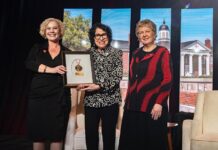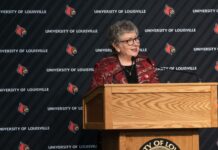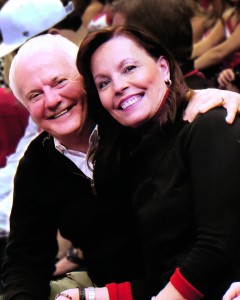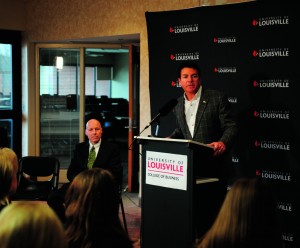Schnatter, Koch foundations fund free market center
When John Schnatter started a pizza business in the back of his father’s Jeffersonville, Indiana, tavern in 1983, he had to figure out on his own how to be an entrepreneur.
That’s one reason Schnatter, now chief executive officer of the highly successful Papa John’s International Inc., and his wife, Annette, gave the College of Business $4.64 million in March to help students learn free market principles.
Their gift, along with a $1.66 million gift from the Charles Koch Foundation, will create the John H. Schnatter Center for Free Enterprise. Two professors and up to four doctoral fellows will teach classes and conduct research at the center. College of Business economics professor Stephan Gohmann will be its director.
“I firmly believe in the spirit of entrepreneurship and the need to equip today’s generation with the know-how to launch successful businesses,” Schnatter said.
The center, which also will bring in speakers and attract visiting professors, will “give our students the opportunity to learn from some of the greatest minds in the world,” said President James Ramsey.
Research to Prevent Blindness awards to UofL approach $4 million
Research to Prevent Blindness (RPB) has awarded $3,959,800 over the past 50 years to the University of Louisville Department of Ophthalmology and Visual Sciences. The latest grant awarded in December totaled $115,000.
The funding supports research across a variety of eye diseases and conditions, said Henry J. Kaplan, MD, department chair, Evans Professor of Ophthalmology and director of UofL’s Kentucky Lions Eye Center.
Research conducted at UofL that RPB helps fund includes studies examining the pharmacologic treatment of age-related macular degeneration, gene therapy in retinal degeneration, stem cell therapy in retinal degeneration, genetic mutations in hereditary night blindness, retinopathy of prematurity, autoimmune uveitis and more.
“We are grateful for the support from Research to Prevent Blindness,” Kaplan said. “With this help, we can continue to carry out groundbreaking research on the development, structure and function of the visual system and discover and develop new treatments for ocular disease.”






























